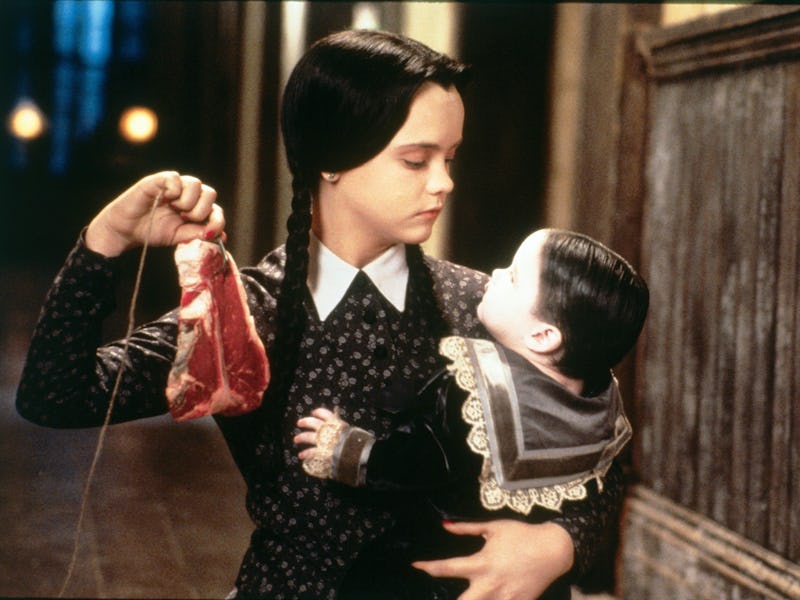Wednesday has become a smash hit, but it owes much of its success to its ‘90s predecessor
Apparently, you can’t tell an Addams Family story without a dance scene.

As great as Jenna Ortega is as the lead in Netflix’s Wednesday, her performance is just the latest iteration of a long-running character created by cartoonist Charles Addams in 1938. Ortega draws on decades of portrayals of Wednesday Addams, and series creators Alfred Gough and Miles Millar, as well as director Tim Burton, similarly draw on decades of depictions of the larger Addams family.
More than any other Addams Family incarnation, Barry Sonnenfeld’s 1993 film Addams Family Values contains the roots of Wednesday, especially the conception of the character as a bold truth-teller who cuts through the pretensions of self-serving authority figures. There are homages to Addams Family Values throughout Wednesday’s first season, most notably in the characters’ trip to the pilgrim-themed attraction in the town adjacent to their secluded boarding school.
It’s perfect viewing for Wednesday fans looking for more of their favorite character, but it’s also hugely entertaining on its own, a stellar example of a 1990s studio comedy with Sonnenfeld working at the height of his talents. Although Wednesday is naturally at the center of her series, here she’s just one part of an ensemble, as she’s been across the history of Addams Family adaptations. Christina Ricci nevertheless commands the most attention whenever she’s onscreen, although she’s matched by the brilliant actors playing the rest of her delightfully morbid family.
Most of those actors return from Sonnenfeld’s 1991 film The Addams Family, including Raul Julia and Anjelica Huston as Wednesday’s parents Gomez and Morticia, Jimmy Workman as her brother Pugsley, and Christopher Lloyd as her Uncle Fester. Carol Kane takes over as Wednesday’s grandmother, and there’s another addition to the family at the beginning of the movie, when Morticia announces her pregnancy right as she goes into labor. The arrival of young Pubert, complete with a full head of jet-black hair and a mustache that resembles his father’s, sends Wednesday and Pugsley into a bit of a crisis, as they try to eliminate the perceived threat from their new sibling.
The scheming Debbie has set her sights on the hapless Fester.
The real threat, though, comes from Debbie Jellinsky (Joan Cusack), who arrives in the guise of a new nanny for the Addams children but is actually a serial killer known as the Black Widow, who marries rich men and kills them on their wedding night, absconding with all their money. Debbie has set her sights on the hapless Fester, who’s immediately smitten with her. When the children seem to catch on to her plan, she convinces Gomez and Morticia to send them away to a summer camp for “privileged young adults.”
The summer camp scenes are Sonnenfeld and writer Paul Rudnick’s most lasting pop-culture contribution, especially Wednesday’s speech during an inexplicable summer Thanksgiving pageant in which she’s cast as Pocahontas. Rudnick offers a succinct takedown of whitewashed Thanksgiving celebrations that exploit the image of Native Americans, which Ricci delivers with a perfect combination of cynicism and outrage. Ortega’s Wednesday echoes similar sentiments when she’s forced to volunteer at historically dubious theme park Pilgrim World.
Wednesday’s speech offers a succinct takedown of whitewashed Thanksgiving celebrations.
Back at the Addams family home, Debbie sets about seducing Fester, starting on a double date with Gomez and Morticia at a fancy restaurant that appears to exist inside a cavern. There, Gomez and Morticia perform a dazzling tango that rivals the viral dance sequence in Wednesday, expressing a passion for each other that burns so intensely it literally sets the floor on fire. Even the devious, scheming Debbie seems in awe of their love, and one of the most entertaining things about this ostensible family comedy is how unabashedly horny all the Addamses are.
The virginal Fester’s downfall is his unbridled lust for Debbie, even after she’s unsuccessfully made multiple attempts to kill him. At camp, Wednesday falls for the nervous, allergy-prone Joel Glicker (David Krumholtz), reflecting the real-life attraction between Jewish nerds and goth girls at summer camps and middle schools across the country. As ever, Gomez and Morticia can’t keep their hands off each other, and their dialogue is sexually charged. Sonnenfeld shoots Huston with separate lighting perpetually illuminating her face like a film noir femme fatale, giving her an almost otherworldly allure.
Gomez and Morticia can’t keep their hands off each other.
The connection between Gomez and Morticia isn’t just about sex, though, and the movie is, in its own twisted way, a celebration of actual family values. The Addamses are endlessly loving and supportive of each other, and the extended clan enthusiastically turns up for Fester’s wedding to Debbie. The irony is that the homicidal Debbie would fit in perfectly with the family if she’d just let herself accept their love.
Some of that sweetness is missing in Wednesday, which offers more family discord in its appearances from Wednesday’s relatives. Addams Family Values proves itself to be pervertedly wholesome, embracing darkness while remaining sharp and hilarious. There’d be no Wednesday without it.
Addams Family Values is streaming on Netflix through January 31.
This article was originally published on